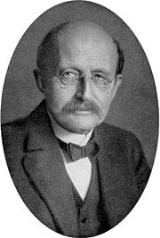
, (April 23, 1858 – October 4, 1947) was a German
physicist
who actualized the quantum physics, initiating a revolution in natural science and philosophy. He is regarded as the founder of the quantum theory
, for which he received the Nobel Prize in Physics
in 1918.
Planck came from a traditional, intellectual family. His paternal great-grandfather and grandfather were both theology
professor
s in Göttingen; his father was a law
professor in Kiel
and Munich; and his pater
nal uncle was a judge
.
Planck was born in Kiel
, Holstein
, to Johann Julius Wilhelm Planck and his second wife, Emma Patzig.
We have no right to assume that any physical laws exist, or if they have existed up to now, that they will continue to exist in a similar manner in the future.![]()
I regard consciousness as fundamental. I regard matter as derivative from consciousness. We cannot get behind consciousness. Everything that we talk about, everything that we regard as existing, postulates consciousness.![]()
Anybody who has been seriously engaged in scientific work of any kind realizes that over the entrance to the gates of the temple of science are written the words: Ye must have faith. It is a quality which the scientist cannot dispense with.![]()
Both Religion and science require a belief in God. For believers, God is in the beginning, and for physicists He is at the end of all considerations… To the former He is the foundation, to the latter, the crown of the edifice of every generalized world view.![]()
New scientific ideas never spring from a communal body, however organized, but rather from the head of an individually inspired researcher who struggles with his problems in lonely thought and unites all his thought on one single point which is his whole world for the moment.![]()

